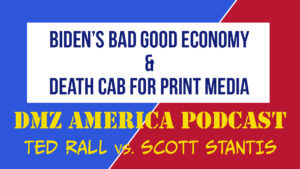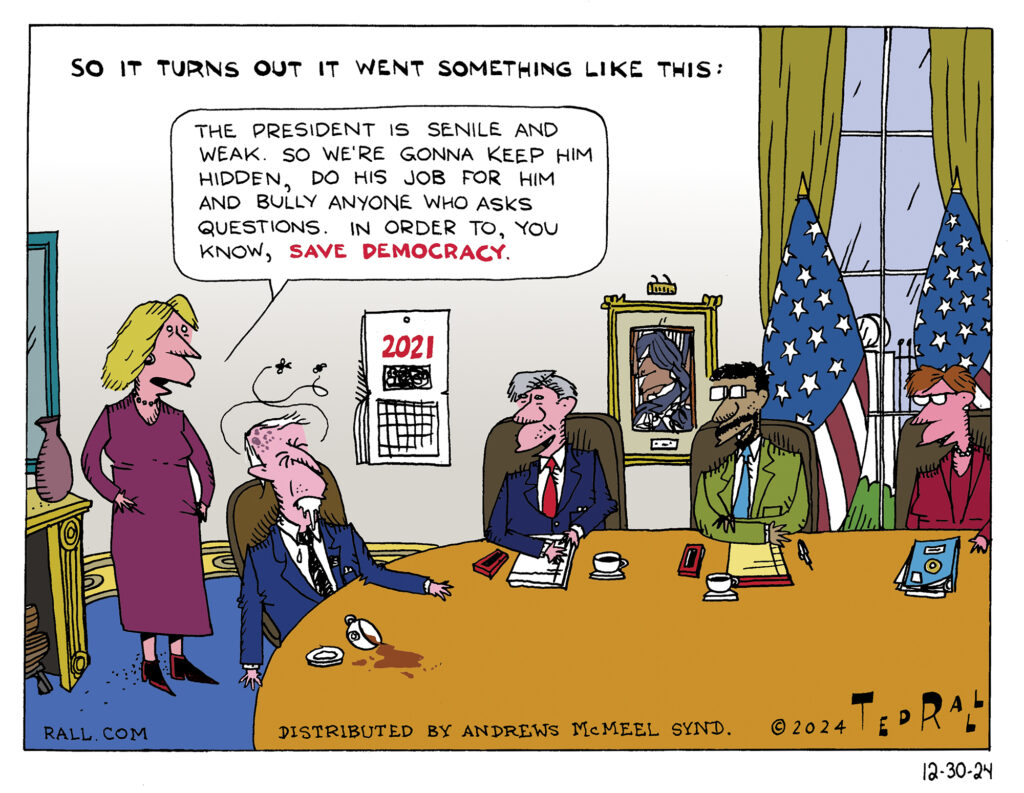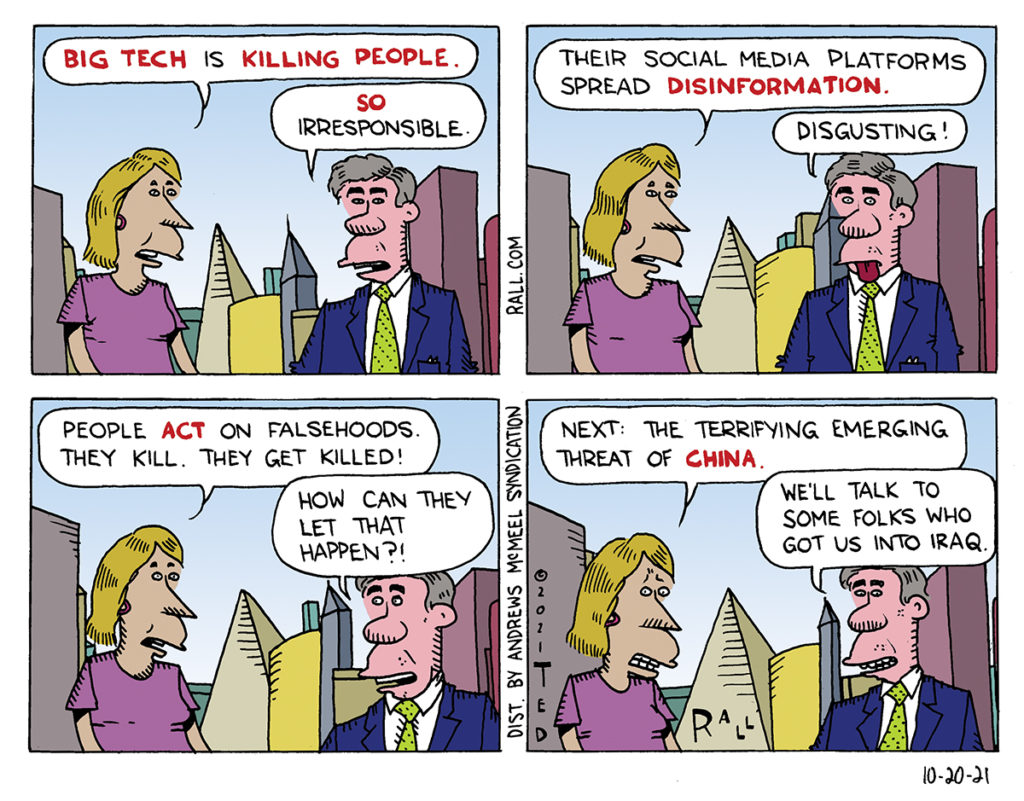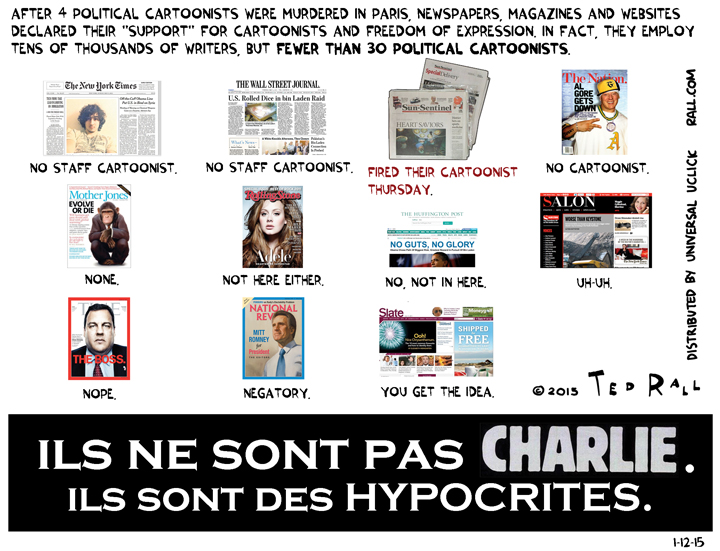The Wall Street Journal has confirmed in a blockbuster investigation that President Biden has been mentally diminished throughout his first term in office. Democrats knew and covered it up.
DMZ America Podcast #134: Biden’s Bad Good Economy & Death Cab for Print Media
 Political Cartoonists Ted Rall (from the Left) and Scott Stantis (from the Right) discuss the week in politics, current events and culture. This time, the guys start out wondering about the state of the economy and the 2024 presidential campaign. Though Biden has pulled ahead of Trump in national polls, key swing states Biden needs to win continue to support Trump. One of the big reasons give is that they’re unhappy with the state of the economy. But unemployment is low, wages are high and inflation is easing. Why are Americans pissed? We have answers.
Political Cartoonists Ted Rall (from the Left) and Scott Stantis (from the Right) discuss the week in politics, current events and culture. This time, the guys start out wondering about the state of the economy and the 2024 presidential campaign. Though Biden has pulled ahead of Trump in national polls, key swing states Biden needs to win continue to support Trump. One of the big reasons give is that they’re unhappy with the state of the economy. But unemployment is low, wages are high and inflation is easing. Why are Americans pissed? We have answers.
The month of January saw major layoffs at legacy media companies like the Wall Street Journal, Los Angeles Times, Sports Illustrated and Pitchfork. Is there a future for journalism, and if so what does it look like?
Watch the Video Version: here.
Big Tech Is Killing People
The Wall Street Journal has published “the Facebook papers,” which revealed that Facebook and other big technology companies have been more than willing to monetize disinformation and misinformation, even when it needs to people’s deaths. Legacy media is laughing, but they should look at themselves too.
Ted Rall Interviews Green Party Candidate Howie Hawkins
Yesterday I interviewed the standard bearer of the Green Party for an essay which includes excerpts from an interview that will appear in the opinion section of the Wall Street Journal on Election Day. Here’s the full video.
Long Form Long Form Long Form! is the Future of Print Journalism
 Journalism is in trouble. Writers of articles pointing this out typically argue that this is really bad for democracy or America or whatever. Anyone who disagrees is too stupid to read this so I won’t bother to repeat this obviousness. Such writers also point out contemporaneous evidence of the media apocalypse; here are the three I came across this week.
Journalism is in trouble. Writers of articles pointing this out typically argue that this is really bad for democracy or America or whatever. Anyone who disagrees is too stupid to read this so I won’t bother to repeat this obviousness. Such writers also point out contemporaneous evidence of the media apocalypse; here are the three I came across this week.
1. 1,800 local newspapers have gone out of business in the last 15 years. Since print newspapers generate nine out of ten stories that appear on radio, TV and online, that’s a big loss.
2. The New Orleans Times-Picayune has closed. This is notable because it’s the first time in memory that a major city’s single major daily (OK, thrice weekly in recent years) has vanished. Its smaller Baton Rouge-based competitor remains but now it’s easy to imagine a real city having no daily paper whatsoever.
3. The influential and notably right-before-anyone-else investor Warren Buffett used to believe in newspapers enough that he bought some. No more. Now he says the only viable print papers are the national megapapers The New York Times, Washington Post and Wall Street Journal. (Disclosure: I write op-eds for the Journal.)
At the same time, the Mueller Report was a bestselling book.
A print book.
Note: you can read it for free online.
Why would anyone pay for the Mueller Report? For the same reason they paid to read the 9/11 Commission Report and the Starr Report about Bill Clinton, two other public documents freely available on the Internet that became bestsellers in print form. Which happens to be the same reason magazines like The New Yorker and The Economist make a profit while many others are tanking. It’s also why the Sunday edition of The New York Times does well.
Long stuff is easier to read in print.
Many readers read the Mueller Report on their electronic devices. As evidenced by the success of the book version, however, a lot of people are willing to pay money to avoid the eye and neck strain of peering and craning at a comparatively low-resolution screen—while retaining less of what they read—for more than 400 pages. And that is the future of print journalism.
In the 1970s the weekly news magazines Time, Newsweek and U.S. News & World Report ran long-form analysis of the stories that had been reported the previous week by daily newspapers. Reporters at the newsweeklies dug deep, unearthed new details and told you what it all meant and why it mattered. They were giants, read by tens of millions of Americans.
Beginning with the rise of the Web in the 1990s, the newsweeklies lost their way. Editors thought the Internet proved that our attention spans were shortening so they slashed word counts. Stories got shorter. There were fewer of them too. So people stopped reading them. Why pay for the same content they could get free online, and sooner? Newsweek basically went out of business. U.S. News is online only. Once the cornerstone of Henry Luce’s empire, Time subsists.
The New Yorker and The Economist are prospering because they doubled down on their commitment to detailed long-form journalism about ongoing issues. Graphically they contain no evidence that the Web ever existed. They carry words, lots and lots of them, occasionally punctuated by hand-drawn illustrations. Some articles weigh in at 5,000, even 10,000 words. These publications don’t break news—they can’t. They deep dive.
You already know what happened. Long-form analysis tells you what it means.
Long form, long form, long form. Long form is the future!
Old formats endure because new ones can’t replace desirable functions. Despite expert predictions TV didn’t kill radio because you can’t watch TV while you drive or clean the house. Print is perfect for long-form publishing because many people prefer flipping pages to scrolling. And it’s easier on your eyes.
The future of print—which, digihype aside, is still where the money is to be made—is analogous to the 1970s, when people read daily papers for breaking news and news magazines for long-form analysis. When news breaks we’ll read about it online, on our devices. A new generation of print outlets will supply after-the-fact analysis that go on for thousands of words, along with comix journalism and complicated charts that require days (rather than minutes or hours) to research, compile and edit.
Newspapers, Buffett said, “haven’t figured out a way to make the digital model complement the print model.” It would be nice to suggest that he is mistaken, that beleaguered newspapers will finally pivot to long form, perhaps replacing their current seven-day runs with a single beefy weekend edition. Unfortunately, he’s right.
Newspapers have never been managed by people with less vision. They’ve fired the experienced out-of-the-box thinkers on their staffs in favor of underpaid Millennials who think they can guilt readers into subscribing the way NPR does during their pledge drives. Listeners support NPR because it offers unique content, not because listeners would feel guilty if it went under. Newspapers ought to have figured out long ago that no one will pay for the same exact news that they read yesterday, for free, on their phones.
“Creative destruction” will erase the dinosaurs. In their place will arise a new generation of print outlets dedicated to long-form analysis and commentary.
(Ted Rall, the cartoonist, columnist and graphic novelist, is the author of “Francis: The People’s Pope.” You can support Ted’s hard-hitting political cartoons and columns and see his work first by sponsoring his work on Patreon.)
SYNDICATED COLUMN: Republican Socialists, Democratic Capitalists
GOP Pols Exploit Anti-Wall Street Rage
Newt Gingrich made a name for himself as the right-wing ideologue who led the 1994 “Republican Revolution.”
What a difference the wholesale collapse of international capitalism makes.
Forget 9/11—everything changed on 9/14/08, when Lehman Brothers hit the skids. Millions lost their jobs. Millions more lost their jobs. And the government refused to help them.
The government’s masters, the bankers, wouldn’t let them. They wanted all that taxpayer money for themselves.
The system was finally exposed as the corrupt, inefficient, cruel pseudodemocracy that we on the Left had always known it was. More than three years have passed yet neither the political class nor its corporate bosses have found the wherewithal to sate the anger of America’s roiling masses with the traditional bundle of social programs. To the contrary, the powers that be are calling for austerity, for gutting what’s left of the safety net.
They’re stealing the rope with which we will hang them.
Political disintegration is disruptive and painful. But it sure is entertaining.
The rise of the Republican primary season’s Anti-Capitalist Brigades is the center ring of this circus of death. At the head of the anti-Romney cadres is one of Newt’s well-heeled supporters, who is dropping a cool $3 million on an ad blitz that denounces Mitt Romney for engaging in slash-and-burn capitalism. (Is there another kind?)
“There’s a company in The Wall Street Journal today that Bain [Capital, Romney’s company] put $30 million into, took $180 million out of and the company went bankrupt,” Newt Gingrich said on January 10th. “And you have to ask yourself: Was a six-to-one return really necessary? What if they only take $120 million out? Will the company still be there? Will 1,700 families still have a job?”
Good questions all. But the heartless beasts who populate Wall Street venture capital firms don’t worry about the blood and tears they leave in their wake. Like all vampires they feast and flee. Their pet Republicans don’t care either. Not usually.
“I think there’s a real difference between people who believe in the free market and people who go around, take financial advantage, loot companies, leave behind broken families, broken towns, people on unemployment,” the former speaker continued.
Not much difference. Not when you think about it. Still, this is a serious slap-the-forehead moment.
Bear in mind, Gingrich is still a man of the Right. A few weeks ago his proposal for forced child labor of impoverished waifs marked the Dickensianest moment of the 2011 Christmas shopping season.
Newt isn’t the only Republican presidential candidate attacking capitalism’s sacred right to loot and pillage. Texas governor Rick Perry, whose brain freezes and loutish yucks over his role as the nation’s top executioner of lower-class misérables (and at least one innocent man) make his predecessor George W. Bush look like Adlai Stevenson, calls buyout specialists like Romney “vultures” who “swoop in…eat the carcass, and…leave the skeleton” of companies they target. Romney, he said, is a “buyout tycoon who executed takeovers, bankrupted businesses, and sent jobs overseas while killing American jobs.”
“Governor Romney enjoys firing people—I enjoy creating jobs,” added Jon Huntsman.
These are Republicans?
What’s up?
“For all the talk about this being a center-right nation, there’s a realization that Americans are uncomfortable with excessive greed and the kind of ruthless, screw-the-workers style of capitalism Romney used to get rich,” Steve Benen writes in Washington Monthly.
Greg Sargent of The Washington Post chimes in: “The leading GOP candidates are on record arguing that Romney’s practice of [capitalism]—which he regularly cites as proof of his ability to create jobs, as a generally constructive force and even as synonymous with the American way—is not really capitalism at all, but a destructive, profit-driven perversion of it. Thanks to them, this is no longer a left-wing argument.”
(Actually, destruction and profit-taking are the essential cores of capitalism. But why quibble? Everyone agrees that capitalism sucks. Yay!)
Times are changin’. According to polls, communism is more popular than Congress. So why isn’t the party of the left jumping on the Wall Street-bashing bandwagon?
Throughout the 2008 campaign and his presidency Barack Obama has taken pains to reassure the 1 percent that if he’s not exactly one of them he’ll look out for their bank accounts. Certainly he has enacted policies that have increased the gap between rich and poor while sucking the life out of the dry husk of the middle class.
Meanwhile, revolution looms.
Why don’t the Democrats see it? Don’t they understand that capitalism is discredited? Newt Gingrich does. So do most Republicans.
It comes down to a simple explanation: Everything has changed, but not the Democrats. They’ve always been slower than the GOP to recognize the shifting winds of American politics, slower to respond, inept when they try.
We used to be a center-right country. Now we’re left-right. Soon we’ll be left-left. Both the Dems and the Reps will be left behind. In the meantime, watch the dying Republicans make the most of an agenda that ought to belong to the dying Democrats: bashing the rich and greedy.
If nothing else, it’ll be entertaining.
(Ted Rall is the author of “The Anti-American Manifesto.” His website is tedrall.com.)
COPYRIGHT 2012 TED RALL



